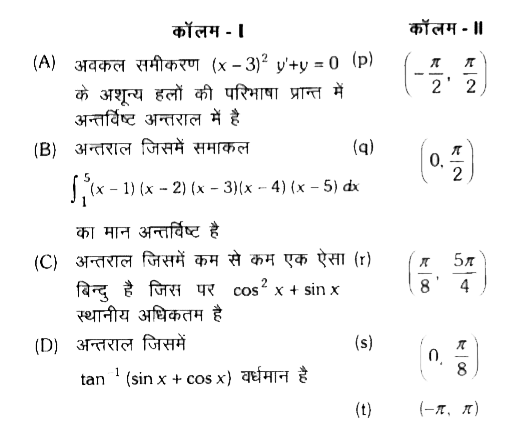यदि ∫ex(1+sinx)dx1+cosx=exf(x)+c, तब f(x) =
sinx2
cosx2
tanx2
logx2
The correct Answer is:C
Step by step video, text & image solution for यदि int (e^(x) (1+sin x)dx)/(1+cos x)=e^(x)f(x)+c, तब f(x) = by Maths experts to help you in doubts & scoring excellent marks in Class 12 exams.
Updated on:21/07/2023Topper's Solved these Questions
- अनिश्चित समाकलन BOOK - ERRORLESS HINDICHAPTER - अनिश्चित समाकलन EXERCISE - JEE ADVVANCED (MORE THAN ONE CORRECT ANSWERS )
4 Videos
- अनिश्चित समाकलन BOOK - ERRORLESS HINDICHAPTER - अनिश्चित समाकलन EXERCISE - JEE ADVVANCED (REASONING TYPE QUESTIONS )
6 Videos
- अनिश्चित समाकलन BOOK - ERRORLESS HINDICHAPTER - अनिश्चित समाकलन EXERCISE - MULTIPLE CHOICE QUESTIONS (आंशिक भिन्नों द्वारा परिमेय फलनों के समाकलन, समाकलन के विभिन्न रूपों का मान ज्ञात करना )
16 Videos
- PAPER(12 APRIL : SHIFT-2)BOOK - ERRORLESS HINDICHAPTER - PAPER(12 APRIL : SHIFT-2)EXERCISE - बहुविकल्पीय प्रश्न
30 Videos
- अवकल समीकरण BOOK - ERRORLESS HINDICHAPTER - अवकल समीकरण EXERCISE - JEE Advanced ( Matrix Match type questions )
3 Videos
Similar Questions
यदि ∫ex−1(x2−5x+4)2xdx=AF(x−1)+BF(x−4)+C तथा F(x)=∫exxdx, हो, तो
View Solutionमाना F(x),sin2x का अनिश्चित समाकलन है
कथन-1 : फलन F(x),F(x+π)=F(x) को संतुष्ट करता है, सभी वास्तविक x के लिए
क्योंकि,
कथन-2 : sin2(x+π)=sin2x सभी वास्तविक x के लिए
View Solution∫dx1+x+x2+x3=
View Solutionमाना की f(x)=5−[x−2] तथा g(x)=|x+1|,xεR यदि f(x) का अधिकतम मान α तथा g(x) का न्यूनतम मान β पर है, तो limx→−αβ(x−1)(x2−5x+6)x2−6x+8 बराबर है
View Solution
View SolutionLet F(x)=(1)/(2)int(sin x+cos x)/(e^(-x)+sin x)dx and F(0)=1 then F(x) is
View SolutionIf int(e^(x)-1)/(e^(x)+1)dx=f(x)+C, then f(x) is equal to
View Solution∫ex{f(x)+f'(x)}dx को खंडश: समाकलन के प्रयोग से ज्ञात कर सकते है |
∫f(x)dx+∫exf'(x)dx=∫exf(x)dx+exf(x)−∫exf(x)dx+c
=exf(x)+c
तथा ∫eax{f(x)+f'(x)a}dx eaxf(x)a+c
इसलिए सही उत्तर चुने :
e^(x)((1+sin x)/(1+cos x))dx=
View SolutionIf ∫ex(1+sinx)1+cosxdx=exf(x)+c, then the value of f(x) is -
View SolutionIf ∫ex−1ex+1dx=f(x)+c, then f(x)=
View SolutionA: ∫ex(1+xlogxx)=exlogx+c
R: ∫ex[f(x)+f'(x)]dx=exf(x)+c
View SolutionIf ∫ex−1ex+1dx=f(x)+c, then f(x) is equal to
View SolutionI = int e^(x) { f (x) + f' (x) } dx can be found using segmented integration. As I = int e^(x) f (x) + dx + int e^(x) f' (x) dx = int e^(x) dx + e^(x) f (x) - int e^(x) f (x) dx + c = e^(x) f (x) + c And int e^(ax) { f (x) + (f' (x))/(a) }dx = a^(ax) (f(x))/(a) + c int e^(x) (tan^(-1) x + (1)/(1 + x^(2)) ) dx = :
View SolutionI = int e^(x) { f (x) + f' (x) } dx can be found using segmented integration. As I = int e^(x) f (x) + dx + int e^(x) f' (x) dx = int e^(x) dx + e^(x) f (x) - int e^(x) f (x) dx + c = e^(x) f (x) + c And int e^(ax) { f (x) + (f' (x))/(a) }dx = a^(ax) (f(x))/(a) + c int e^(x) (tan x - log cos x ) dx = : int e^(x) ((1 + sin x)/(1 + cos x )) dx = :
View SolutionIf ∫ex(1+sinx)dx1+cosx=exf(x)+C, then f (x) is equal to
View Solution
